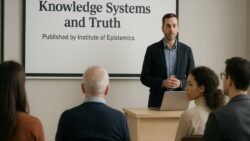Workshops on Logic – Participating in workshops on logic, perception, and cognitive ethics this year offers an opportunity to deepen intellectual engagement while exploring practical applications of these disciplines. Logic provides the foundation for clear reasoning, perception allows us to understand how humans interpret reality, and cognitive ethics explores how decisions and thought processes align with moral responsibility. Together, these areas form a powerful combination for anyone interested in philosophy, psychology, or emerging technologies such as artificial intelligence. Attending such workshops not only enhances knowledge but also strengthens critical thinking, problem-solving, and analytical reasoning skills that are essential in both academic and professional contexts. These sessions often include interactive discussions, case studies, and real-life examples that help participants connect theory to practice. For individuals pursuing careers in research, education, or ethical technology development, participation in these workshops can prove transformative. Moreover, such events are spaces where people from diverse fields collaborate, making them ideal for networking and building meaningful intellectual partnerships.

Why Logic Workshops Matter in Today’s World
Workshops focusing on logic encourage participants to develop structured thinking, uncover fallacies, and understand how reasoning impacts decision-making in daily life. From philosophy to computer science, logical reasoning is a crucial element in shaping arguments and analyzing information. By attending these workshops, participants learn how to assess the validity of statements, identify weak arguments, and construct sound reasoning frameworks that can be applied across disciplines. For instance, in the age of information overload, the ability to filter truth from misinformation has become a critical skill. Initiatives like the Stanford Encyclopedia of Philosophy’s entry on classical logic provide a foundation for learners, but workshops take this further by applying concepts in interactive settings. With industries increasingly relying on data-driven strategies and algorithmic models, having a strong grasp of logical principles ensures that individuals can critically evaluate processes, policies, and even ethical dilemmas in technology and governance.
Exploring Perception and Its Role in Understanding Reality
Workshops on perception invite participants to consider how humans interpret sensory experiences and how biases or illusions shape our understanding of reality. Perception is not a passive process; rather, it is shaped by both biological factors and cultural context. Engaging in such workshops allows individuals to explore questions about how people see the world differently, how cognitive distortions emerge, and why perception plays a vital role in communication and decision-making. For example, research shared by the American Psychological Association on perception emphasizes the complexities of how humans process sensory data. By bringing these theories into a workshop format, learners can test their assumptions through experiments, group discussions, and scenario analysis. Such exploration can benefit educators, psychologists, and professionals in design or media, where understanding human perception directly impacts effectiveness. Additionally, in an increasingly digital age, studying perception also helps unpack how technology influences the way information is received and interpreted.
The Importance of Cognitive Ethics in Modern Society
Cognitive ethics workshops emphasize moral responsibility in decision-making, especially as artificial intelligence, neuroscience, and behavioral science evolve rapidly. These workshops encourage participants to reflect on how values and ethical considerations shape cognition and how technology might amplify or challenge these norms. By addressing questions such as how algorithms should make decisions or how humans should responsibly use cognitive enhancement tools, participants gain insight into real-world ethical dilemmas. According to the Ethics Unwrapped project at the University of Texas, ethical decision-making frameworks are essential in navigating modern challenges. Within a workshop setting, learners analyze case studies and engage in debates to apply ethical reasoning to complex issues. This prepares them not only for academic discussions but also for professional roles where responsible innovation is expected. Cognitive ethics is especially crucial for leaders in policy, technology, and education, as their choices significantly impact societies and future generations.
Building Networks and Lifelong Learning Opportunities
Beyond the academic value, participating in workshops on logic, perception, and cognitive ethics fosters connections with like-minded individuals who share intellectual curiosity and a commitment to ethical knowledge-building. These spaces often bring together scholars, practitioners, and students from diverse fields, creating fertile ground for collaboration. Networking at such events can open doors to joint research, interdisciplinary projects, and even new career pathways. Moreover, the interactive nature of these workshops ensures that learning does not remain abstract but becomes embedded in practice. According to Britannica’s overview of continuing education, such lifelong learning initiatives play a critical role in personal and professional development. Workshops also help participants stay updated on evolving debates in philosophy, psychology, and cognitive science, ensuring they remain adaptable in a fast-changing world. By attending this year’s sessions, learners can position themselves at the intersection of critical inquiry, ethical responsibility, and practical problem-solving—skills that are vital for shaping a more thoughtful and equitable future.







